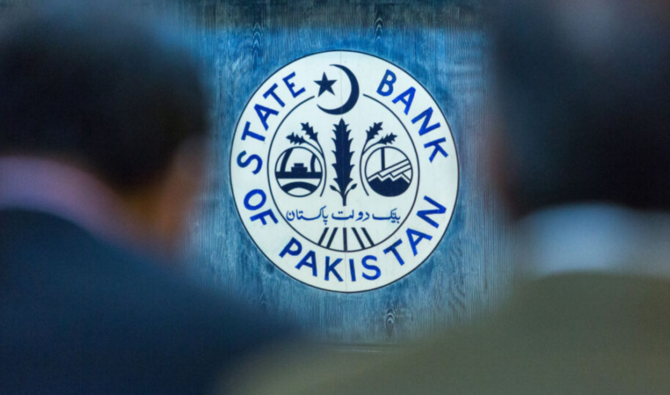KARACHI: Pakistan’s central bank held its key policy rate at 12% on Monday, saying it was adopting a “cautious” approach in order to stabilize inflation and consolidate economic gains.
The State Bank of Pakistan (SBP) has slashed rates by 1000 bps from an all-time high of 22% in June 2024 to revive economic sentiment and growth while navigating reforms under a $7 billion bailout program from the International Monetary Fund (IMF) approved last September. But on Monday, the monetary policy committee “reiterated the importance of maintaining a cautious monetary policy stance to stabilize inflation within the target range of 5–7 percent.”
The decision to hold the interest rate comes despite cooling inflation that slowed to a near decade low of 1.5% in February. That was below the government’s forecast and significantly lower than a multi-decade high of around 40% in May 2023. The fall in inflation has been largely due to a decline in food and energy prices. Easing consumer prices have helped the central bank lower its borrowing costs by 1,000 basis points since June and support economic growth.
“The committee assessed the risks posed by the inherent volatility in these prices to the current declining trend in inflation,” the central bank said, adding that core inflation persisted at an elevated level and thus a hike in food and energy prices could lead to an increase in inflation.
Monday’s decision surprised many in the market where the majority of the economists were expecting a rate cut ranging from 50-150 basis points owing to favorable inflation numbers and the need for increased demand in the economy.
Amreen Soorani, head of research at Al Meezan Investment Management, said the central bank decided to adopt a “cautious stance” as the normalized real interest rate in Pakistan stood close to 400 basis points — higher than the historical average of near 150-200 basis points.
The central bank, however, deems the current real interest rate as “adequately positive” on a forward-looking basis to sustain ongoing macroeconomic stability.
“The strategy may continue to consolidate the economy for now, with a lower GDP growth and controlled inflation,” said Soorani.
In its previous monetary policy statement in January, the central bank called the 1,000 basis point reduction in interest rate “significant,” saying it would continue to support economic activity. On Monday, the bank said the impact of a sizable earlier reduction was now materializing.
The central bank maintained its earlier forecast of 2.5% to 3.5% growth and said economic activity in the country of more than 240 million people could gain further momentum and economic growth was expected to recover in the second half of FY25 ending June on the back of easing financial conditions.
According to Muhammad Waqas Ghani, head of research at JS Global Capital, the decision to hold the interest rate may not “drastically” change consumer and business borrowing behavior since the rates were already lower than before.
Pakistan seeks to achieve 3.6% economic growth this fiscal year through June on the back of structural reforms backed by the IMF, a staff mission of which is in Pakistan to review the country’s performance under its $7 billion Extended Fund Facility (EFF). A successful review will result in the release of about a $1 billion tranche to Pakistan that would keep its balance of payment position in check.
The State Bank said while economic activity was gaining traction, some pressures had emerged on the external account because of growing imports and weak financial inflows. The uptick in some global commodity prices had also pushed up Pakistan’s import payments in January.
Pakistan’s current account turned into a deficit of $0.4 billion in January after showing surplus over the past few months. This coupled with weak financial inflows and ongoing debt repayments weighed on Pakistan’s foreign exchange reserves, which have declined to $11 billion, enough to finance two months of imports. The State Bank, however, reaffirmed its current account balance projection of a surplus and a deficit of 0.5% for this year.
The nation expects its foreign exchange reserves to increase beyond $13 billion by June despite weak net financial inflows caused by a shortfall in the planned official inflows. Pakistan has also repaid the majority of its external debt due this year, according to the central bank.
The country faced a revenue shortfall during the last two months in January and February, which may concern the IMF mission that wants Pakistan to increase its revenues through taxing incomes from the agriculture, real estate and retails sectors and hiking energy tariffs. The central bank said meeting the target for primary balance would be challenging.
“It would be crucial for the SBP to carefully manage the potential risks, particularly concerning inflation and currency stability,” Soorani told Arab News.
Meanwhile, Pakistan’s main business association expressed disappointment the central bank had maintained the interest rate despite lower inflation.
“The business, industry and trade community of Pakistan is disappointed with the monetary policy as it continues to be based on a heavy premium vis-à-vis core inflation,” said Atif Ikram Sheikh, president of the Federation of Pakistan Chamber of Commerce & Industry, the nation’s biggest representative body of traders and industrialists.
















